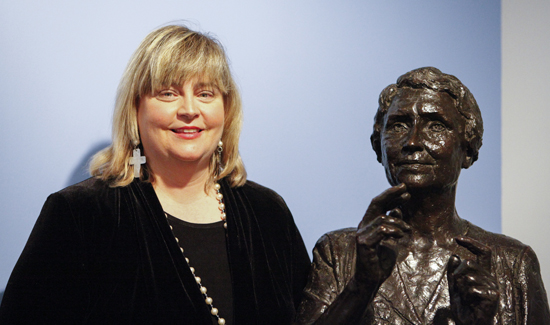A Q&A with Keller Johnson-Thompson, Helen Keller's great-grandniece
March 4, 2013
Celebrating Helen During Women's History Month
[Editor's note: In light of Women's History Month, we will be running a series of interviews with Helen Keller experts on the AFB Blog. First up: Keller Johnson-Thompson, Helen's great-grandniece.]
Helen Keller was an ambassador for those with vision loss. Working for the Helen Keller Foundation for Research and Education, you are an ambassador for Helen. What difficulties do you come across, if any, in promoting the life of a woman who is so very famous?
One of the most difficult obstacles I face when promoting the life of Aunt Helen is that many people think of Helen Keller as the child at the water pump. Most of them can guess that she dedicated her adult life to work for those who are blind or visually impaired, but they have no idea of all the other work she was involved in such as labor unions, women's suffrage, civil liberties, and world peace. The American Government even used Helen Keller as an Ambassador. Also, Helen Keller was a very outspoken woman during her day, and while people loved her, not everyone agreed with her political views, so that sometimes makes my job difficult (to say the least).
Does being her great grandniece influence how you promote her?
Yes, definitely. As her niece, I have tried to study every aspect of her life. So many people, I find, take parts of people's lives and then believe that they know them. But I think it is very important to study someone's entire life and works, as well as what was happening globally during that time, to know Helen Keller's thoughts, her opinions, her hopes, and her dreams. I take it personally when someone makes an unkind remark about her. She was a good person, with a strong faith and a huge heart for mankind. I am very proud of the many areas of life in which she made a strong and unwavering stance. I am even more proud to call her my Aunt.
Helen lived most of her life in the North, where her progressive politics were more readily accepted. How would you characterize the position of women today in the South? How have things changed for those with disabilities?
I certainly believe that the position of women has excelled in the South since Helen Keller's time. Women have moved into more professional roles here, and they are praised and commended for their many stances on the world we live in today. I am sure Helen would find it much more comfortable to live in the South now, than she did as young women with liberal ideals. People with disabilities are treated so much more as equals than they were during Aunt Helen's time in the South. However, due to the smaller cities and communities in the South, I do not believe they have the same opportunities in employment, transportation, and other independent living arrangements as they do in the larger populations of our Nation.
To be continued...
About Keller Johnson-Thompson
